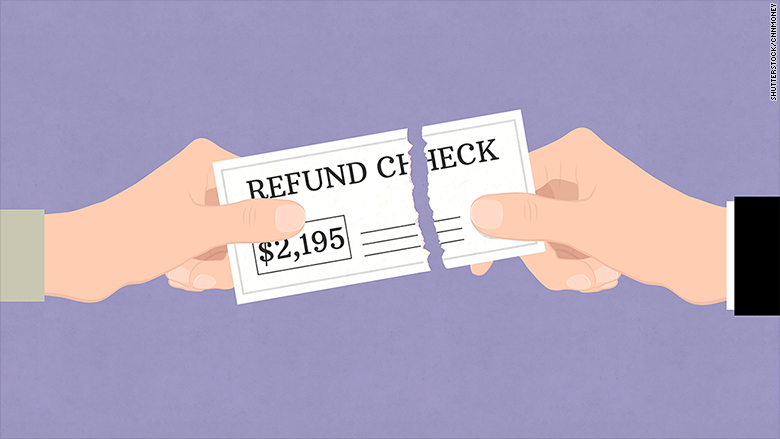
The majority of H&R Block clients who received federal help to pay for their health insurance in 2014 got an unwelcome surprise when it came to their refund.
Sixty-one percent of those filers saw their refunds reduced by an average of $729 -- or a third of the group's overall average of $2,195, the consumer tax services provider said Monday.
The reason for the decline: they'd underestimated what their 2014 household income would be when they signed up for insurance on a health exchange back in 2013.
The lower your income, the higher your federal subsidy. Anyone earning up to 400% of the poverty line is eligible for a subsidy. That means any individual earning up to $45,960 (or $94,200 for a family of four).
If you received a subsidy based on an estimated income that turned out to be lower than your actual income, you must repay a portion of the subsidy.
Roughly 13% of the H&R Block-prepared returns involving health insurance subsidies saw no change in their refunds, while about 25% actually saw their refunds increase by an average of $425 because those filers had overestimated their 2014 incomes.
Filers who remained uninsured for more than three months in 2014 were subject to a penalty. The average penalty paid was $178 among its affected clients, H&R Block said.
The penalty for being uninsured in 2014 was $95 or 1% of income, whichever is greater. This year, it will be the greater of $325 or 2% of income. That means an uninsured family of four with a $60,000 income would see their penalty jump to $975 from $400 in 2014.
If you don't have the money to pay the penalty or if you refuse to pay, the only legal way for the government to collect that money is to withhold as much of your refund as necessary.
There are, however, some exemptions to the penalty that a filer may claim. Among H&R Block clients who claimed a penalty exemption, 46% said their income fell below the tax-filing threshold.
H&R Block did not reveal how many 2014 returns it prepared that had a federal subsidy component. But the company did say it prepared 20.5 million returns overall.
The IRS, which is the final arbiter on tax statistics for the country, has not yet released a statistical analysis of the 2014 returns.
